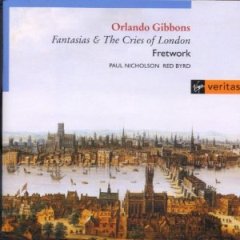Orlando Gibbons - Fantasias & The Cries of London (1996)
Orlando Gibbons - Fantasias & The Cries of London (1996)

01 - Fantasia in 6 parts
02 - Fantasia in 3 parts
03 - Fantasia in 3 parts
04 - Fantasia in 6 parts
05 - Go from my window in 6 parts
06 - Prelude & Ground for organ
07 - Galliard in 3 parts
08 - Fantasia in 3 parts for the 'Great Dooble Base'
09 - Fantasia in 4 parts for the 'Great Dooble Base'
10 - Fantasia in 2 parts
11 - Fantasia in 3 parts
12 - Fantasia in 3 parts
13 - Fantasia in 6 parts
14 - Fantasia in 3 parts for the 'Great Dooble Base'
15 - Fantasia for the organ
16 - In Nomine in 5 parts
17 - The Cries of London (Part I)
18 - The Cries of London (Part II) play
19 - In Nomine in 4 parts
Fretwork with Red Byrd - tenor, Paul Nicholson - organ
Fretwork is a consort of viols based in England, United Kingdom. Formed in 1986,
the group consisted of six players. Its repertoire consists primarily of music of the Renaissance period,
in particular that of Elizabethan and Jacobean England, arrangements of the music of Johann
Sebastian Bach, and contemporary music written for them.
Orlando Gibbons (baptised 25 December 1583 – 5 June 1625) was an English composer, virginalist and organist of the late Tudor and early Jacobean periods. He was a leading composer in the England of his day. Gibbons wrote a quantity of keyboard works, around thirty fantasias for viols, a number of madrigals (the best-known being "The Silver Swan"), and many popular verse anthems. His choral music is distinguished by his complete mastery of counterpoint, combined with his wonderful gift for melody. Perhaps his most well known verse anthem is This is the record of John, which sets an Advent text for solo countertenor or tenor, alternating with full chorus. The soloist is required to demonstrate considerable technical facility at points, and the work at once expresses the rhetorical force of the text, whilst never being demonstrative or bombastic. He also produced two major settings of Evensong, the Short Service and the Second Service. The former includes a beautifully expressive Nunc dimittis, while the latter is an extended composition, combining verse and full sections. Gibbons's full anthems include the expressive O Lord, in thy wrath, and the Ascension Day anthem O clap your hands together for eight voices. He contributed six pieces to the first printed collection of keyboard music in England, Parthenia (to which he was by far the youngest of the three contributors), published in about 1611.
Gibbons's surviving keyboard output comprises some 45 pieces. The polyphonic fantasia and dance forms are the best represented genres. Gibbons's writing exhibits full mastery of three- and four-part counterpoint. Most of the fantasias are complex, multisectional pieces, treating multiple subjects imitatively. Gibbons's approach to melody in both fantasias and dances features a capability for almost limitless development of simple musical ideas, on display in works such as Pavane in D minor and Lord Salisbury's Pavan and Galliard.
download (mp3 @192 kbs):
yandex mediafire uloz.to mega 4shared cloudmailru gett
Last Updated (Thursday, 23 November 2017 13:44)








